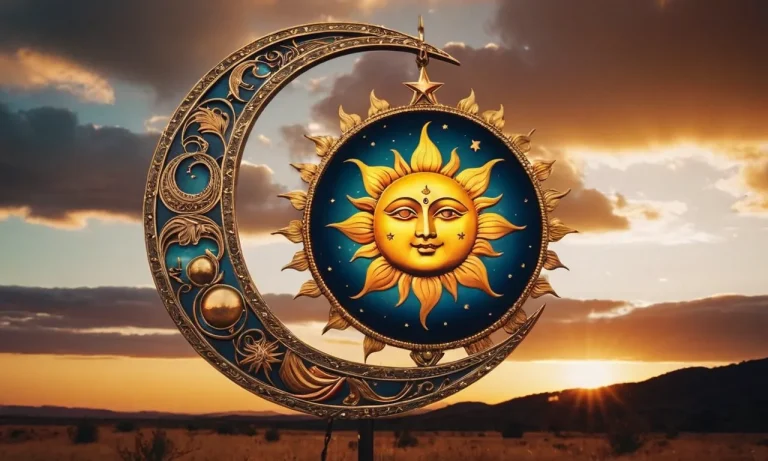Have you ever been jolted awake in the middle of the night by a strange whistling sound? If so, you likely wondered what was making the noise and if it had any deeper meaning.
If you’re short on time, here’s a quick answer to your question: Hearing unexplained whistling at night can have spiritual or symbolic significance in many cultures and belief systems. It may be seen as a sign from the spirit world, an omen, or an indication that there are spirits present trying to communicate with you.
In this comprehensive guide, we’ll explore the various spiritual meanings and superstitions around hearing whistling noises in the late hours across different traditions. We’ll look at what messages the whistling may be trying to convey, how to interpret any omens, as well as tips for responding appropriately.
Common Superstitions and Meanings
Omens and Warnings
Hearing whistling at night has long been considered an omen or warning in many cultures. Some believe it signifies that misfortune or even death is coming. For example, there is an old Irish superstition that hearing the high-pitched wail of the bean sidhe (banshee) foretells a family death.
In parts of Mexico and Latin America, hearing whistling indicates that a witch or evil spirit is nearby. It may be taken as a sign to ward off bad energy with prayer or protection charms. An old Aztec belief says listening too closely to ghostly whistling can lead one to wander off and become lost in the spirit realm.
Presence of Spirits or Ghosts
A common superstition shared by many cultures links nighttime whistling with spirits or ghosts making their presence known. For instance, in Vietnam hearing inexplicable whistling is tied to pháp sư, a powerful wizard thought to wield influence from beyond the grave.
Some believe ghostly whistling is the transformed soul of one who met tragedy. There is an Eastern European legend that says night whistling comes from breathing trees containing souls of those who died by hanging. Who knew trees could be so spooky! But in a cool way if you’re into otherworldly stuff.
Divine Messages
Though often an omen of misfortune, night whistling isn’t always seen negatively. For example, certain pre-colonial Filipino tribes considered it a divine sign. If whistling was high and intense, battle was imminent. However, if it was low and calm, prosperous, bountiful times were ahead.
Some indigenous North American customs link messages of peace to a mysterious wind referred to as “the whistler.” Representing divine breath, its sound was thought to signify a pact between tribes. Pretty deep meaning for such a simple sound!
While nighttime whistling superstitions vary greatly, common threads connect them. Regardless if it bodes well or ill, background whistling tends to signal metaphysical forces at play or a veil lifting between physical and spirit realms. Spooky – but kinda cool!
Whistling at Night in Different Cultures and Religions
Celtic Folklore
In Celtic folklore, hearing whistling or strange melodies at night, especially from afar, often signified the presence of spirits or the Fair Folk. Celts believed the sound carried mystical power and could signify death or a general foreboding of bad luck.
The superstitious avoided whistling at night so as not to anger the spirits or invite misfortune. There were also tales that hearing ghostly whistling actually warded off wandering evil spirits.
Native American Beliefs
Many Native American tribes in the Midwest believed that night whistling marked the presence of a harmful skinwalker nearby. Skinwalkers were said to mimic whistling to lure victims out after dark. Hearing whistling was seen as an omen to stay safely inside one’s dwelling after nightfall.
Some Plains Indian tribes alternatively felt mysterious night whistling was caused by the harmless wandering spirits of their ancestors.
Christianity
In Christian traditions, mysterious whistling at night when no one seems present has often been attributed to angels, the Holy Spirit, or God Himself communicating through a Divine “tongue.” There are biblical references to God whistling to gather His people or make a joyful noise.
Night whistles with no discernible source have signaled coming danger, a call to prayer or wakefulness, or the imminent arrival of Christ in some Christian folk beliefs.
Islam
Islamic theology cautions to ignore whistling heard at night if alone as it may come from Jinn, a supernatural spirit. The Quran references how God created beings called Jinn from smokeless fire. While some Jinn can be mischievous, Islam says most Jinn leave people alone if not provoked.
Hearing Jinn whistling after dark, especially tempting melodies, can signal one’s possible weakness against Shaitan (Satan).
Hinduism and Buddhism
In religions originating in ancient India, night whistling had various symbolic meanings. Hindu theology references subtle beings called Gandharvas skilled in music and mischief. Hearing alluring whistles in the dark could signify Gandharvas deceptively luring people away from righteous living.
Buddhism also saw illusory spirits called Apa that enjoyed deceiving devotees with mysterious whistles to test mental clarity and wisdom. Staying centered was recommended if unexplained whistling occurred at night.
How to Interpret the Whistling and Respond
Identifying Any Omens or Warnings
Hearing unexplained whistling at night can sometimes be interpreted as an omen or warning according to certain spiritual beliefs. If the whistling has no obvious physical source and feels out of the ordinary, some believe it may signify the presence of spirits trying to convey a message.
Some superstitions hold that night whistling foretells danger or death, especially if it sounds very shrill or persistent. However, whistling can have multiple meanings, so try not to jump to frightening conclusions immediately.
Pay close attention to any intuitions, sensations, or symbolic images that come to mind when you hear the whistling. Your inner guidance may reveal whether it represents a benevolent sign, a caution about potential misfortune, or something else entirely.
Communicating with Spirits
If the whistling feels supernatural, some believe you can attempt communication with its spiritual source. Before interacting, ground and protect yourself spiritually by visualizing being surrounded by warm, glowing light.
Then mentally or aloud introduce yourself in a friendly, compassionate way and ask if the spirit has a message for you. Pay attention for any intuitive or emotional impressions. You may also perceive symbolic images conveying their meaning.
If the message relates to a deceased loved one, the spirit may be trying to reassure you they are peacefully at rest. Take comfort from feeling their enduring spiritual presence and guidance.
Seeking Guidance Through Prayer and Meditation
Hearing perplexing whistling can also serve as a reminder to connect spiritually through prayer, meditation, or divination. Set aside quiet time to reflect on what messages the sound may hold.
Some methods to decode the meaning include:
- Praying for divine guidance and revelation
- Meditating to tap your inner wisdom and intuition
- Using divination tools like tarot cards or runes
Trust your natural insights and sensations. For instance, do you sense encouragement and reassurance or caution and forewarning? Let your heart lead the interpretation.
If the whistling indicated a departed loved one’s presence, have compassionate dialogues in your mind and heart. Express anything left unsaid between you or resolve any lingering emotional conflicts.
By listening within while being receptive to subtle signs like night whistling, you can gain greater spiritual awareness and inner peace.
Debunking and Rational Explanations
Ventilation or Plumbing Sounds
Hearing odd whistling noises at night can often be explained by noises caused by ventilation systems or plumbing in homes and buildings (👍). As temperatures change from day to night, heating and cooling systems activate, and pipes and ducts expand or contract, which can cause whistling or wind noises.
While these sounds may be alarming when half-asleep (causing some to irrationally suspect paranormal causes), they generally have simple mechanical explanations. Checking insulation around ductwork or having an HVAC professional inspect the system can help resolve persistent whistling coming from vents.
Animal Noises
Nocturnal animal sounds, especially birds and bats, may also be misinterpreted as unexplained whistling (“What was that weird whistle sound outside my window last night?”). Creatures of the night emit a variety of vocalizations – hoots, screeches, trills – to attract mates or defend territories.
An unfamiliar nighttime whistle may come from a new arrival to the neighborhood: mourning doves, screech owls, or nighthawks, for example. Improving insulation around windows or playing soft background noise can help drown out disturbing animal whistles.
Hypnagogic Auditory Hallucinations
Hearing a phantom whistle while falling asleep or waking up may indicate hypnagogic auditory hallucinations. As the brain transitions between wakefulness and sleep, the auditory cortex can misinterpret random neurons firing as perceivable sounds that are not real like ringing, hissing, static, music, or voices (leading some to wrongly suspect ghosts or paranormal activity).
Hypnagogic hallucinations are generally harmless, but those severely distressed by them can talk to their doctor about potential underlying conditions or temporary sleep medication options.
| Possible Source | Explanation |
|---|---|
| Ventilation/Plumbing | Metal ducts/pipes whistling from air changes or temperature differences. |
| Animal Noises | Unfamiliar nighttime animal vocalizations like hoots or trills. |
| Auditory Hallucinations | Misinterpreted neuron activity in the brain when falling asleep/waking up. |
So while hearing an odd whistle at night may seem inexplicable or even paranormal, over 90% of cases have rational explanations after investigation. Seeking logical reasons first before jumping to supernatural conclusions can ease worries over peculiar nighttime noises.
When to Seek Help for Persistent or Bothersome Whistling Noises at Night
Hearing whistling sounds at night can be alarming and disruptive to sleep. While occasional subtle noises may not be concerning, persistent or loud whistling could indicate an underlying issue that requires medical evaluation.
Interfering with Daily Life
If the whistling noises are significantly interrupting your ability to fall asleep or stay asleep at night, it’s a good idea to consult your doctor. Lack of quality sleep can greatly impact your health, wellbeing, and daily functioning. Getting to the root cause of the noises is important.
Associated Symptoms
Certain symptoms alongside whistling noises should prompt a medical visit. These include but aren’t limited to:
- Headaches or migraines
- Dizziness or vertigo
- Ear pressure or pain
- Hearing loss
These associated complaints suggest there may be an underlying ear, nose, throat, or neurological issue causing the sounds.
Worsening Over Time
Whistling that seems to get louder, more frequent, or shriller over days or weeks warrants evaluation too. Things that deteriorate typically don’t improve on their own. Getting ahead of the problem by seeing an audiologist, ear/nose/throat doctor, or neurologist is wise.
Don’t hesitate to discuss persistent or troublesome nighttime whistling sounds with your physician. They can determine any related conditions and guide appropriate treatment to help quiet the noise and improve rest.
Conclusion
The next time you hear mysterious whistling noises cutting through the silence of the night, don’t immediately worry that it signifies impending doom or danger. While the sound may have spiritual symbolism across various beliefs, there are also plenty of rational explanations too.
Carefully analyze when and how often you hear the whistling, under what circumstances, and whether it aligns with any cultural omens you’re aware of. If the noise has a clear mundane source or is considered benign, then simply chanting a mantra or prayer may provide comfort and peace of mind.
However, if the whistling persists frequently or is accompanied by other troubling phenomena, seek help from medical, audiological, or spiritual support networks to get to the bottom of what’s causing it. With openness, wisdom, and the right guidance, you’ll likely find the true meaning.






